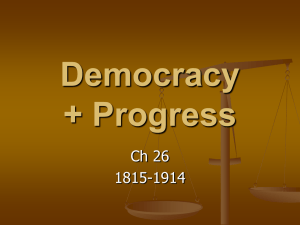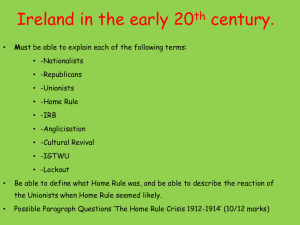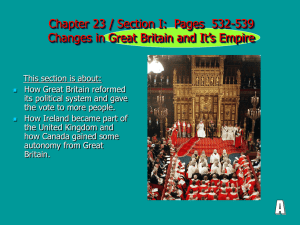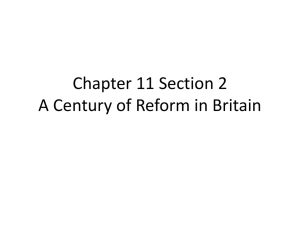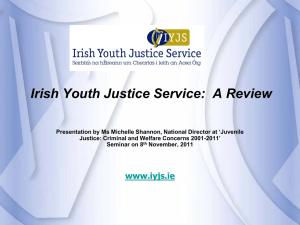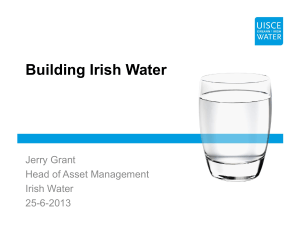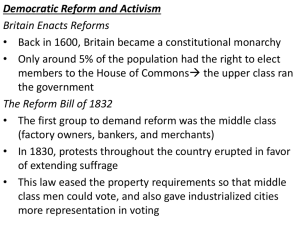Social and Economic Reform in Britain
advertisement
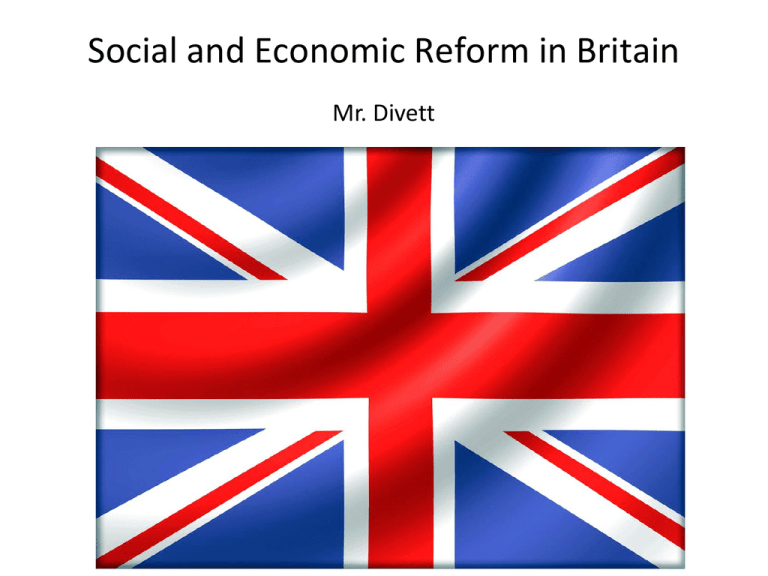
Social and Economic Reform in Britain Mr. Divett Important Reforms • In the early and mid 1800s Parliament passed important new laws: – – – – Free trade- end to tariffs on trade between countries. Based off of the idea of laissez faire. Some British tariffs were repealed in the 1820s. The Corn Laws remained, these were heavy tariffs on imported grain. Free traders called on Parliament to repeal the Corn Laws. Free Trade End of Corn Laws • • Parliament repealed the Corn Laws in 1846. In the late 1800s, economic hardship led Britain and other European countries to reinstate tariffs. Corn Laws Campaign Against Slavery • • • • In 1807 Britain became the first European power to abolish slave trading. This was due to Enlightened ideas about the evils of slavery, as well as pressure from the abolition movement. This did not actually ban slavery. In 1833, Parliament passed a law banning slavery. British Abolition Movement Crime and Punishment • • • In the early 1800s more than 200 crimes were punishable by death. The following were capital offenses: – Murder – Shoplifting – Sheep stealing – Impersonating an army veteran Some juries would not convict criminals because the punishment was so harsh. The Death Sentence Being Pronounced Executions • • • Executions occurred in public. A hanging would often draw a crowd of thousands of spectators. Criminals did not receive a proper burial, their bodies were often given to medical colleges for dissection. Public Execution in Manchester Changes to Punishment • • • Capital offenses were reduced. By 1850 the only crimes punishable by death were: – Murder – Piracy – Treason – Arson Parliament ended public hangings in 1868. Penal Colonies • • Petty criminals were transported to penal colonies, or settlements for convicts. These colonies were set up in the new British territory of Australia. Australian Penal Colonies Victories for the Working Class • • • • Working conditions were dangerous during the early industrial age. Parliament started to pass laws to regulate conditions in factories and mines. 1842- mine owners were forbidden to employ women or children under the age of 10. 1847- women and children were limited to a 10-hour work day. British Industrial Revolution Victories for the Working Class • Other laws that were passed in the late 1800s: – Regulation of safety conditions – Enforcement by safety inspectors – Minimum wage – Maximum work hours The Growth of Labor Unions Labor unions used to be outlawed during the early Industrial Revolution. Unions became legal in 1825, but going on strike remained illegal until later. Union membership exploded between 1890 and 1914. Unions improved the lives of the working class by: Demanding higher wages Demanding shorter hours Labour Unions Later Reforms Both parties enacted reform to benefit the working class between the late 1800s and the early 1900s. Disraeli sponsored laws to: Improve public health Improve worker housing Gladstone pushed: Free elementary education for all children To open government jobs based on merit, not birth or wealth Fabian Society Socialist society Founded in 1883 Promoted gradual change through legal means, not violence. Labour Party Formed in 1900 Grew in power Became one of Britain's two main parties by the 1920s Social Welfare Laws Britain began passing them in the early 1900s. They protected the poor and disadvantaged. These laws were modeled after those of Bismark in Germany. They provided accident, health, and unemployment insurance This was an argument against socialism. Women's Suffrage Emmeline Pankhurst was a suffragist. She promoted suffrage through radical means including: Interupting speakers in Parliament with “Votes for women!” Organized massive public demonstrations. Violence: Breaking windows, burning buildings. Hunger strikes. In 1918 Parliament granted the right to vote to women over 30. Women’s Suffrage Instability in Ireland Britain had been conquering Ireland in the 1100. Ireland was colonized in the 1600s. Absentee landlords owned large estates but did not live in them. Irish peasants paid rent to landlords in England. They also (even though they were Catholic) had to pay tithes to the Church of England. Irish Nationalism The Irish resented British influence and rejected British rule. In the 1800s Irish nationalist campaigned for freedom and justice. Daniel “The Liberator” O'Connell organized the Irish Catholic League to demand fairness. In 1829 Parliament passed the Catholic Emancipation. This let Irish vote and hold political office, but not enjoy freedoms like speaking their language. Daniel O’Connell Irish Potato Famine Under British rule, three quarters of Irish farmland was used to grow crops to export. In 1845, a disease destroyed the potato crop. Tenants were evicted because the had no money. Britain continued to ship what was left away, and about one million men, women, and children died of starvation or disease. Many immigrated to the U.S. or Canada. Irish Potato Famine Struggle for Home Rule The Irish famine left the Irish with distrust for the British. In 1850 they created the Fenian Brotherhood to liberate Ireland from British rule by force. In 1870 a leader was chosen, Charles Stewart Parnell. He pressed Parliament for home rule, or local self government. Home Rule at Last In 1914 passed a home rule bill. It delayed the law until 1921 when southern Ireland became independent.

